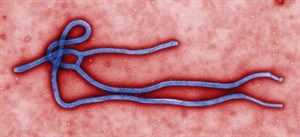
Image Credit: AP Photo/CDC
October 27, 2014 - 4:30 PM
THOMPSON-OKANAGAN – The risk of Ebola in the interior of British Columbia is a low one, but that hasn’t stopped the international departments at Thompson Rivers University and the University of British Columbia’s Okanagan campus from taking direction or developing a plan for international student travel.
“The key part of what we’re doing is really following federal and provincial initiatives where they’re really watching travel from (outbreak) countries,” Mike Henniger, director of international marketing at TRU World, says.
Henniger says students from all countries within Africa are subject to a medical exam prior to travelling to Canada. The results of the exam are sent to the Canadian Embassy for approval, but Henniger says the exam can be taken up to two months in advance of the student’s trip.
While the medical exam will include tests for Ebola, it is not specific to the disease. The exam tests for several other communicable diseases, including HIV and is standard review to ensure the student is of good health.
“Any country that has a medical outbreak, the standard thing is that the Canadian embassy will basically hold their study permit until after the outbreak has cleared,” Henniger says.
Current international students who plan to make a return to Africa are required to submit a travel plan to an international student advisor before departing Canada. He adds staff will not be travelling to infected areas.
Paul Marck, a media spokesperson for UBCO, says he’s not familiar with the Canadian embassy’s protocol but says international students are expected to self monitor and self report and abide by home country and Canada’s policies on innoculations.
“It’s a non-issue for us at this point. People are aware of the risks. We are taking direction from the B.C. Centre for disease control. At this point it’s something that we want to make sure people are aware of but it’s not something that’s an issue on campus,” Marck says.
Neither UBCO nor TRU have international students coming from any of the West-African countries where Ebola is present. Guinea, Liberia and Sierra Leone are countries with wide-spread transmission of the disease. Nigeria, Spain and the United States are labelled as affected areas with travel-associated cases and localized transmission.
As of Oct. 25 4,922 have died from the disease.
UBCO has 800 international students from 92 different countries including African nations. Each semester, TRU hosts approximately 1,750 students from over 85 countries.
To speak more on the topic of Ebola and understand the risk of the disease, TRU professor Michael Mehta will host a forum this Thursday, Oct. 30. The event will take place in the university’s Arts and Education building at 7:00 p.m.
To contact a reporter for this story, email Glynn Brothen at gbrothen@infonews.ca or call 250-319-7494. To contact an editor, email mjones@infonews.ca or call 250-718-2724.
News from © iNFOnews, 2014